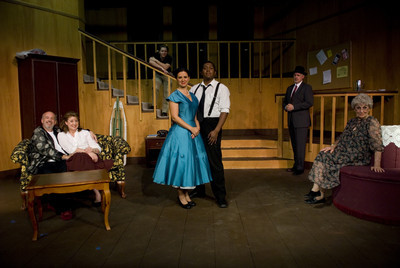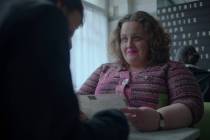Loony Love Letter
Left, right, independent (or Ron Paul die-hard) -- admit it, the line's a laugh:
"Theater is a lifeline to our humanity. Without it, we'd all be Republicans."
Ken Ludwig might've loaned it to Barack Obama had he not already tucked it into "Moon Over Buffalo," the playwright's otherwise nonpartisan farce whose agenda, above all political considerations, is comedy (frequently synonymous with politics) linked to a deep affection for theater's eccentric, endearing gypsies.
"People who love theater will absolutely love this play," says Sarah O'Connell, director of the frenetic free-for-all that opens a three-weekend, season-opening run tonight at Las Vegas Little Theatre. "It's about the heart and soul of people who put themselves through what they go through just to make theater happen. And in a place like Vegas, you can certainly understand the struggle."
Amen, sister.
"It's a very aerobic experience for the actors," O'Connell says about the witty workout, chockablock with mistaken identities and misunderstandings, actors racing around a set made for slamming-door farce, including four doors and a flight of stairs for characters to run in, out, up and down, plus a closet (in which to hide a hogtied character).
"There are 86 different scenes where somebody goes in or out, that's how fast it moves. There are sword fights and wrestling and rolling on the floor and Shakespeare passages, everything but the kitchen sink."
Ludwig's loony love letter to theater, which famously returned Carol Burnett to the Broadway stage after a 30-year absence in 1995, is set in 1953 at a repertory theater in Buffalo ("Scranton without the charm"), where acting couple George and Charlotte Hay -- competent thespians but not quite level with the Lunts -- toil on "Private Lives" and "Cyrano de Bergerac." Having found only marginal success in Hollywood, they're still admiring of each other's onstage abilities.
(He to she: "You're an actress, it's in your veins. If you were caught in the spotlight of a coming train, you'd break into a time-step." She to he: "When you do it like that, at center stage, I wet myself. I can't help it.")
Yet jealousy and regret remain, as in George's resentment when the lead of legendary director Frank Capra's "The Twilight of the Scarlet Pimpernel" goes to Ronald Colman ("They're filming at this very moment, and Ronald Colman is wearing my tights").
"I liken them to Harvey Korman and Tim Conway, wonderful people who never quite got the big step up," says John Ivanoff, who plays George. "But they were great at what they were doing."
On that Conway/Korman wavelength, Barbara King notes that as Charlotte, "I can't do Carol Burnett, obviously. But I like the grande dame aspect of Charlotte. And when I was younger, I did do 'Private Lives.' Because I'm British, it's easy for me to do that high-falutin' accent."
Over one day, sitcom/slapstick situations abound. Charlotte discovers George has impregnated Eileen, the troupe's ingenue. Their daughter, Roz, is engaged to befuddled TV weathercaster Howard but returns home and fights her feelings for Paul, her ex-fiance and the company's stage manager. Charlotte is ardently courted by smitten lawyer Richard, and everyone endures Ethel, Charlotte's nearly deaf and completely batty mom. But most spectacularly, a call comes from Capra saying that Colman was injured on set, and Capra's flying in to see that day's matinee to possibly replace Colman with George -- who is by now plastered after weathering Charlotte's wrath -- and giving Charlotte the role once belonging to Greer Garson, kicking off backstage chaos.
At one point, Charlotte even mistakes her daughter's doofus fiance for Capra.
"When I first read the play, I was very confused," says Ivanoff, whose character portrays characters in "Cyrano" and "Private Lives," which he rehearses in the first act and performs -- albeit strangely, and in a stupor -- in the second act, as the actors get conflicting information about which play they're actually staging.
"I felt like 'Sybil' at some points, but when I first heard it at a read-through, it became really funny," Ivanoff says. The confusion, O'Connell adds, is central to the silliness. "It's a play within a play within a rehearsal within a play," she says. "Take that, Shakespeare."
For Ivanoff, it's critical not to go around the bend in an over-the-top play. "The difficulty with farce is not trying to go for the laugh, because it's really built into what you do, you don't have to stretch if you do it correctly," he says. "The material gives you plenty to work with."
His acting partner, playing his acting partner, agrees. "There's a fine line between being large and mugging," King says. "You have to be careful. But you can also just let it rip."
No matter how mad the madness, what remains is an homage to those who find the glory in the greasepaint.
"This play poses the question, 'Is theater really dead?' " O'Connell says. "The answer this play gives -- and as far as LVLT and the people in this town are concerned -- is no."
Amen, sister.
Contact reporter Steve Bornfeld at sbornfeld@reviewjournal.com or 702-383-0256.
PREVIEW what: "Moon Over Buffalo" when: 8 p.m. today, Saturday and Thursday, 2 p.m. Sunday (through Sept. 28) where: Las Vegas Little Theatre, 3920 Schiff Drive tickets: $19-$22 (362-7996)




























